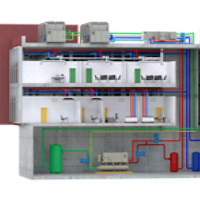Webinar
Scope 1 Emissions Reduction: Why All Eyes are On Heat Pump Technology
Institutions with sustainability goals that include a transition from direct fossil fuel usage (Scope 1 emissions) are increasingly adopting heat pump technology as a low-carbon solution for heating and cooling requirements. Heat pumps, which are nearly a 100-year-old technology, provide ultra-high efficiency cooling and enable heating requirements to be met with the same high-efficiency technology.


Institutions with sustainability goals that include a transition from direct fossil fuel usage (Scope 1 emissions) are increasingly adopting heat pump technology as a low-carbon solution for heating and cooling requirements. Heat pumps, which are nearly a 100-year-old technology, provide ultra-high efficiency cooling and enable heating requirements to be met with the same high-efficiency technology.
The outcome is reduced operational expenses and reduced electrical capacity requirements relative to traditional electrical resistance heating technology. Join Trane to learn more about this technology, how it dovetails with corporate sustainability commitments, and a future outlook on technology capabilities.
Key Learning Objectives:
- Learn how and why heat pump technology can support emissions reduction goals
- Understand key differences, benefits, and drawbacks of heat pump technology relative to other heating and cooling technologies
- Explore a framework for how to evaluate and integrate heat pump technology into your decarbonization program
- Get insights from real examples of emissions reduction projects that leverage heat pump technology
Speaker
-
Trevor Joelson
Trevor Joelson is an Account Executive for Trane’s energy and decarbonization program for multi-site, private sector customers. Through this program, Trevor collaborates with large enterprises to define their environmental sustainability objectives and establish initiatives to reduce operational emissions through financially attractive and measurable projects.
Trevor joined Trane through an acquisition of Fellon-McCord in 2016 and has held various roles in corporate energy & sustainability management over the last decade. His subject matter expertise is in the energy markets and how the supply-side of energy connects to the built environment.
Trevor lives with his family in Dallas, TX and is a graduate of the University of Louisville.





